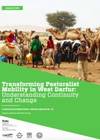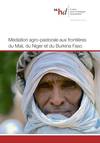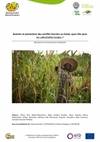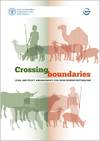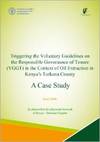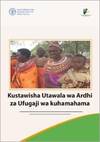Pastoralism is practiced by millions of people worldwide. It has roots in every part of the world and back thousands of years to the beginning of agriculture. But while pastoral societies have existed for millennia, we still don’t know that much about the interlinkages between pastoral practices and the rangelands these depend upon. It’s as if they are invisible in a lot of research about the global environment. There are many questions we cannot answer today with confidence because of widespread gaps in understanding rangelands and pastoralists. Yet, the answers to these questions have profound implications for national and global policy – and influence on how we will deal with climate change.
Year of publication: 2019Organization: Programa de las Naciones Unidas para el Medio Ambiente (UNEP)
Topic: Servicios ambientales, Tierra, Resiliencia
Language: English
Type of document: Técnico
Geographical coverage: Global
Earlier studies have shown that pastoralist mobility offers significant advantages in drylands by enabling herds to access the best-quality grazing over the course of a year. These patterns of mobility face many challenges and are changing. This study focuses on livestock movement in West Darfur, Sudan. It uses GPS tracking to illustrate mobility during the hot dry season and the rainy season. We find that compared with the past, grazing zones are retracting closer to home areas. The report proposes a typology of livestock movements and describes the ways in which herders are responding to challenges related to pasture, water, and conflict and also to livelihood activities. We present provisional recommendations to serve as the basis for further discussion.
Year of publication: 2019Organization:
Topic: Cambio climático, Conflicto, Seguridad alimentaria, Tierra, Resiliencia
Language: English
Type of document: Técnico
Geographical coverage: África Oriental
Dans la région du Sahel, les conflits d’accès aux ressources naturelles opposant communautés nomades et sédentaires ne cessent de se multiplier le long des routes de transhumance. Rapidement instrumentalisés, ces micro-conflits nourrissent l’émergence de conflits armés intercommunautaires qui alimentent à leur tour l’insécurité régionale. Face au risque de militarisation croissante de ces conflits agro-pastoraux dans la région, HD appuie depuis 2015 des réseaux de médiateurs communautaires au profit de la résolution des conflits d’accès aux ressources naturelles.
Year of publication: 2019Organization: Autores individuales
Topic: Conflicto, Tierra
Language: Français
Type of document: Técnico
Geographical coverage: África Occidental
Change is coming to the traditional way of life of Mongolia’s livestock herders. And with it comes additional risks to their economic and food security. The problem is what’s known as a dzud – a summer of very high temperatures and little rainfall followed by the harshest of winters. FAO’s Early Warning Early Action system had started to pick up dzud warning signs in the autumn of 2017. This video showcases describes this approach implemented by FAO to mitigate the impact of the 2017/18 localized dzud on vulnerable herders.
Year of publication: 2018Organization: Organización de las Naciones Unidas para la Alimentación y la Agricultura (FAO)
Topic: Cambio climático, Economía, Seguridad alimentaria, Resiliencia
Language: English
Type of document: Videos
Geographical coverage: Asia Central
Ce document propose d’explorer les différents mécanismes, traditionnels et modernes de gestion des conflits fonciers au Sahel. Il met également en avant les initiatives d’organisations de la société civile pour prévenir ces conflits, et questionne le rôle des collectivités locales dans ces processus.
Year of publication: 2018Organization: Unión Europea (EU), Agencia Francesa de Desarrollo
Topic: Conflicto, Tierra
Language: Français
Type of document: Técnico
Geographical coverage: África Occidental, África Central
In many countries, pastoralism has historically been practiced in areas that are now partitioned by international boundaries. This is a major barrier to sustainable resource management and to pastoral development. However, there are examples from around the world of efforts to facilitate transboundary movements and transboundary ecosystem management by pastoralists. This report examines how pastoral mobility has been impacted by the creation of unnatural boundaries within their landscapes and how societies cope with these constraints through legal or informal arrangements.
Year of publication: 2018Organization: Organización de las Naciones Unidas para la Alimentación y la Agricultura (FAO), Unión Internacional para la Conservación de la Naturaleza (IUCN)
Topic: Conflicto, Tierra, Resiliencia
Language: English
Type of document: Técnico
Geographical coverage: Global
The case-study presents the case of the appropriation of pastoral lands by the coming of large-scale extractive industries in Turkana, Kenya. The case-study is meant to raise awareness among the general audience regarding the precarious situation of the pastoralists in the context of this new socio-economic development and lack of secure land tenure. At the same time, it provides this information as a case to local and global civil society, experts, institutions and policy makers. Moreover the document makes some recommendations regarding the scope and applicability of the VGGTs, especially the technical guide on improving the governance of pastoral lands in this context.
Year of publication: 2018Organization: Organización de las Naciones Unidas para la Alimentación y la Agricultura (FAO)
Topic: Pueblos indígenas, Tierra, Organización, Participación, Resiliencia
Language: English
Type of document: Técnico
Geographical coverage: África Oriental
The publication is an informational pamphlet on the VGGT guide on improving the governance of pastoralist lands. The pamphlet is meant to be a tool for civil society to informa pastoralist communities regarding the VGGT and its applicability in securing their rights to resources. At the same time the pamphlet also speaks to local administrators regarding the principles enshrined in the VGGT. This audience is chosen to raise awareness regarding the VGGT as a country endorsed mechanism for securing land resources and livelihoods for pastoralist communities.
Year of publication: 2018Organization: Organización de las Naciones Unidas para la Alimentación y la Agricultura (FAO)
Topic: Pueblos indígenas, Tierra, Organización, Participación
Language: Kiswahili
Type of document: Técnico
Geographical coverage: África Oriental



